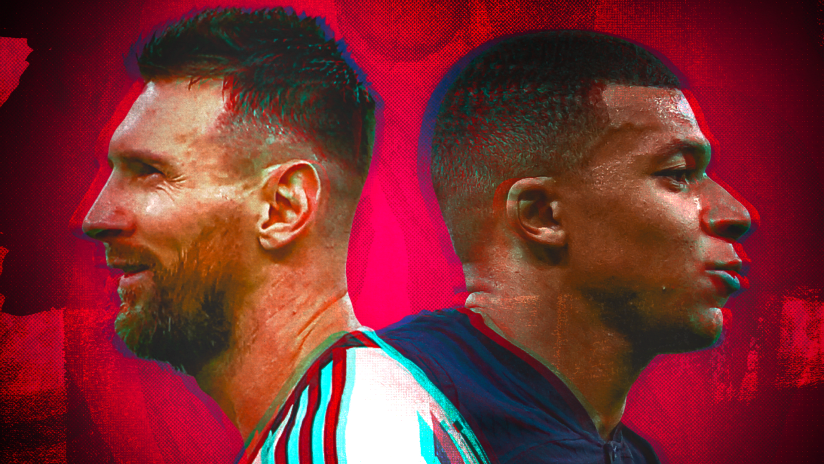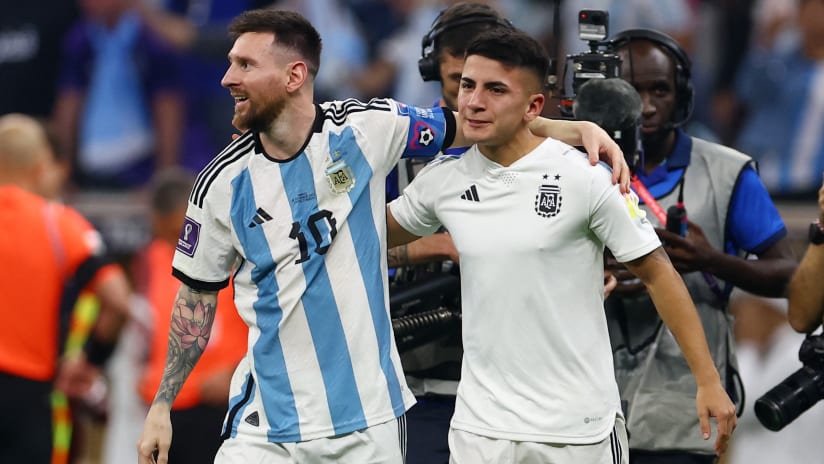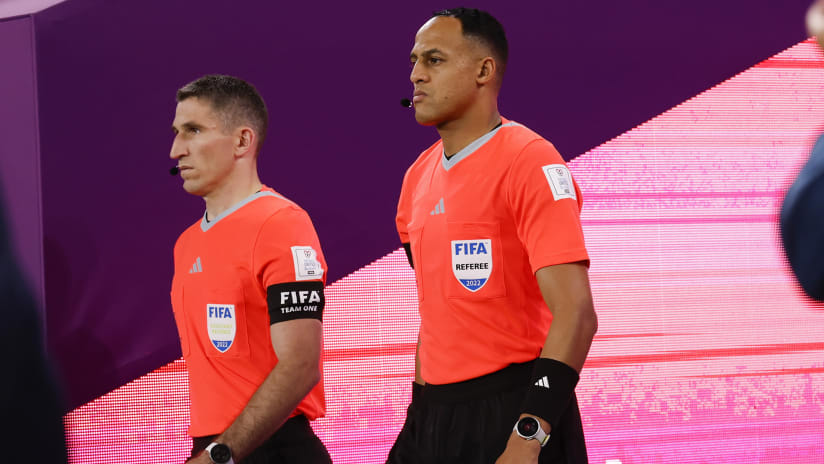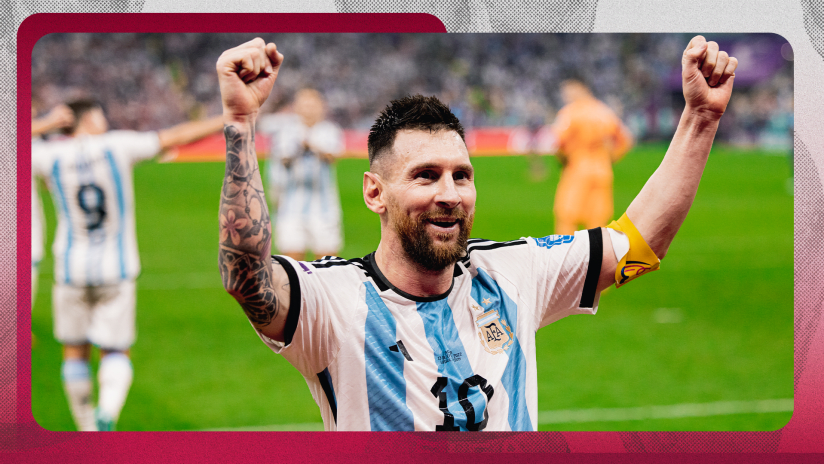It took a few twists and turns to get there (hello Morocco, Croatia and, to a lesser extent, Japan), but in the end, the FIFA 2022 World Cup Final has set up as many expected: Two traditional heavyweights battling it out for a chance at eternal glory.
When France and Argentina kick off Sunday at Lusail Stadium in Qatar (10 am ET | FOX, Telemundo), the two giants of international soccer will have more in common than not, including their top-class pedigree.
Both were in the top three of BetMGM’s pre-tournament odds to win it all. Both have won two World Cups (Les Bleus are the defending champions, while La Albiceleste last won in 1986). Plus both feature transcendent superstars in France’s Kylian Mbappe (arguably the best player in the world at the moment) and Argentina’s Lionel Messi (arguably the best player of all time).
But as vanquished tournament favorites Brazil, England, Spain and Portugal can all attest, the difference between winning and losing at this level is razor-thin.
It’s in those margins that we’ll try to decipher who’s more likely to lift their third-ever World Cup trophy.
With apologies to the tactics experts and analytics gurus of the world, any analysis of this match has to start with the teams’ best players.
Messi (five goals, three assists) and Mbappe (five goals, two assists) have both been that good, sitting in first and second place, respectively, for the World Cup’s Golden Boot award (awarded to the player with the most goals, using assists as a tiebreaker).
But it’s not just the counting stats that give the two top-billing. It’s how they’ve achieved them. Timely goals, individual moments of brilliance, making their teammates look better – Messi and Mbappe have done it all, practically matching each other highlight for highlight along the way.
That makes deciding the better player for the final a matter of head versus heart.
Head says Mbappe has the edge, as he’s scored 31 more club goals than Messi since the start of the 2021 club season and three more non-penalty goals at this World Cup. Plus, at age 23 – 12 years younger than Messi – he should on paper have more energy to be involved in meaningful buildup and, possibly related, has dominated Messi 1.51 to 0.83 in goal-creating actions per 90 at the tournament, according to FBref.
Heart says Messi is on a predestined path to cement his status as the greatest player of all time on Sunday. He’s seeing and completing passes that by all rights shouldn’t exist, scoring penalty after penalty with cold-blooded efficiency, and playing with an overall emotional intensity that we’ve rarely seen from the usually stoic No. 10 – even getting in multiple arguments with Dutch players and coaches after the final whistle of Argentina’s tense 2-2 penalty kick win over the Netherlands.
Whether you’re more of a head or heart person is up to you.
World Cups are hard. There’s a reason why only the same eight countries (six in the last 50 years) have passed the trophy back and forth since the tournament’s inception. The grueling 32-team gauntlet ensures only the best survive.
That in mind, no champion is ever going to skate through all seven matches without poor stretches of play, but that makes controlling the tempo all the more important whenever possible. Teams who allow their opponents to dictate terms of play (by possessing the ball, winning duels, controlling the midfield, et cetera…) put themselves at risk of being run ragged as they chase the game across the pitch.
Here, Argentina have a slight edge. From a bird’s-eye view, they’re better in possession (57.7% to 52.5%), and they average about 100 more passes a game and close to 25 more passes a game in their opponent's half. More tellingly, they’ve held each of their opponents to less than 0.70 expected goals per match, as opposed to France, who’ve allowed their three knockout round opponents an average of 1.75 expected goals per match.
In other words, Argentina have kept other teams at bay far more effectively than France, and they’ve accomplished a lot of that by dominating the ball and the tempo.
That doesn’t mean La Albiceleste are tiki-taka Spain or Luka Modric’s Croatia, both of whom can drain the life from a game with endless – and sometimes aimless – passing triangles. It just means their tactical setup, which features shorter, quicker passes and more players in the middle of the park, lets them spend more time with the ball and less time chasing, at least compared to France.
If Argentina can control matches with short, quick passes, then France can break them open with long, sweeping ones.
Thanks to the speed and skill of their wingers, Mbappe and Ousmane Dembélé, the final-pass ability of their No. 10, Antoine Griezmann, and the aerial prowess of their striker, Olivier Giroud, Les Bleus are incredibly dangerous in open spaces. They don’t need to control a game in the midfield, they just need to cause a few turnovers, get the ball wide and let their world-class attackers do world-class things.
On average, France’s possessions are about five seconds shorter than Argentina’s, and they complete more than twice as many crosses a game. So, basically, when they win the ball, they waste little time getting it to the wings – usually Mbappe’s left wing – and then, with the help of overlapping fullback Theo Hernández (one goal, two assists), deliver lethal crosses into the box.
But, as with Argentina, France aren’t married to a single style of play. They went against the script to score their first goal against Morocco, patiently passing the ball across the backline before delivering a line-splitting pass to Griezmann in the box to unbalance the Atlas Lions' deep defensive shape. Conversely, Argentina disrupted Croatia’s possession-based style with multiple devastating counter-attacks that led to goals.
At this stage, whoever’s left can win in multiple ways. Still, an end-to-end, transition-heavy game favors Les Bleus.
How do you decide the favorite in a match that features two teams with elite talent and contrasting but equally-effective styles of play? Well, form seems as good a metric as any, and Argentina have the advantage there.
As mentioned, the expected goals differential from each team’s knockout stage matches heavily favors La Albiceleste. Plus, in beating Croatia 3-0, Argentina seem to have gotten over their bad habit of taking their foot off the gas late and letting opponents mount comebacks. Up until that semifinal match, lackadaisical defending when closing out matches had been their biggest Achilles’ heel.
France, on the other hand, have spent the majority of their last two matches on the back foot. They got dominated in nearly every metric against England and needed a Harry Kane penalty miss to avoid extra time. Then, against Morocco, they spent most of the second half in extreme scramble mode protecting a one-goal lead until they finally found a second goal to close the door.
France’s rope-a-dope style did carry them to a World Cup triumph in 2018 and has brought them back to the mountaintop in 2022. It’s been over thirty years since a team reached back-to-back World Cup finals (ironically, Argentina were the last to do it), so clearly they're doing something right.
The thing is, usually a team can only take so many proverbial punches before getting knocked out.













